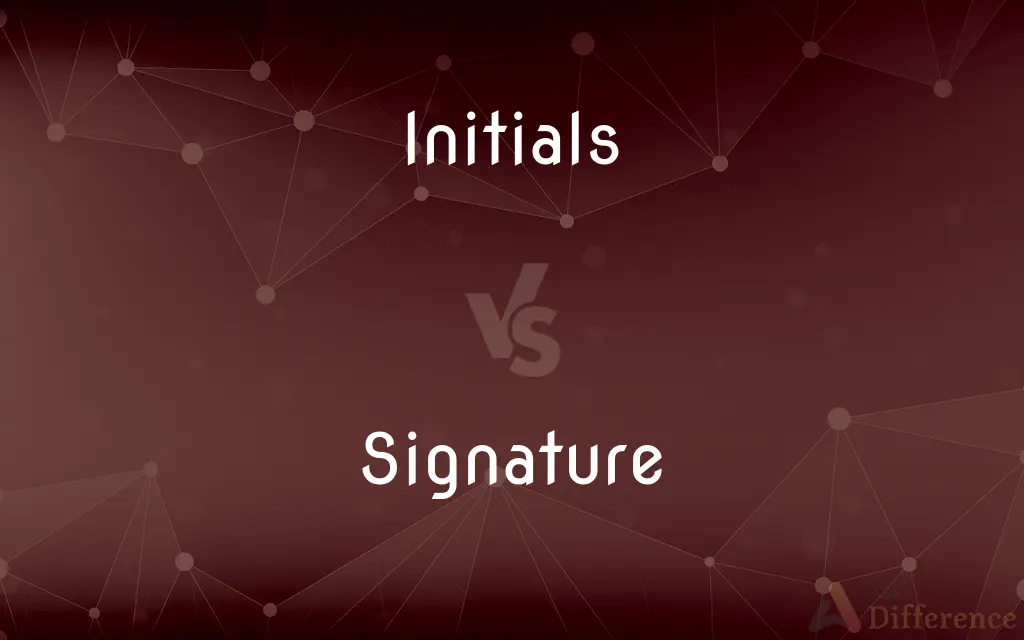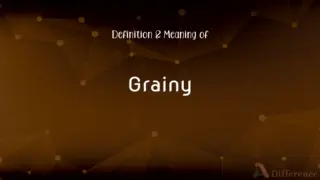Initials vs. Signature — What's the Difference?
By Urooj Arif & Fiza Rafique — Updated on April 21, 2024
Initials are abbreviated forms of a person's full name, used for quick identification, while signatures are full handwritten depictions of one’s name, serving as a personal mark of authentication.

Difference Between Initials and Signature
Table of Contents
ADVERTISEMENT
Key Differences
Initials consist of the first letters of each part of a person's name and are typically used in informal or internal documents to signify agreement or acknowledgment. Whereas signatures are complete representations of a person's name, crafted in a unique stylized form, and are used on formal documents like contracts and agreements to legally bind the individual.
Initials can be quickly written and require less space, making them convenient for approving minor documents or internal communications. On the other hand, signatures are more detailed and require more care to execute, reflecting their use in more significant, often legally binding, contexts.
Because initials are simpler and less distinct, they generally offer weaker security against forgery compared to signatures. Signatures, with their complex strokes and styles, provide a higher level of security and are difficult to replicate accurately.
In some settings, such as certain legal or business environments, initials may be used to indicate a review or minor approval, while a signature signifies full approval or authorization. This distinction emphasizes the varying degrees of formal acknowledgment attributed to each.
Despite their differences, both initials and signatures are personal markers used to represent an individual's identity. However, the formality and context of their use clearly distinguish between the casual nature of initials and the more formal, binding nature of signatures.
ADVERTISEMENT
Comparison Chart
Definition
The first letters of a person's full name.
A person's name written in their own handwriting.
Use
Informal or internal documents for quick approval.
Formal documents for legal or official authorization.
Length
Very short, usually 2-3 characters.
Longer, can vary with the full name and stylization.
Security
Lower due to simplicity and ease of replication.
Higher due to unique personal style and complexity.
Legal Binding
Generally less legally binding.
Strongly legally binding and used in significant agreements.
Compare with Definitions
Initials
Initials are often used to sign emails informally.
Best, J.F.K.
Signature
Signatures are required for legal documents like wills and contracts.
Please sign your name at the bottom of the contract.
Initials
In documents, initials are used to indicate approval on individual pages.
Please initial each page for confirmation.
Signature
A signature can be stylized in various ways, often making it distinctive.
Each artist has a unique signature on their works.
Initials
Initials may appear in monograms on personal items.
J.F.K. embroidered on a handkerchief.
Signature
A signature is a handwritten depiction of someone’s name.
Barack Obama’s signature includes his full name with unique flourishes.
Initials
Initials are the first letters of each word in a person's full name.
John Fitzgerald Kennedy's initials are J.F.K.
Signature
Electronic signatures replicate a person's handwritten signature digitally.
Use your electronic signature for online transactions.
Initials
Initials can also represent a company or brand in a logo.
HBO stands for Home Box Office.
Signature
Signatures may include titles or additional elements in formal contexts.
Dr. Jane Smith, M.D.
Initials
Of, relating to, or occurring at the beginning; first
Took the initial step toward peace.
Signature
A signature (; from Latin: signare, "to sign") is a handwritten (and often stylized) depiction of someone's name, nickname, or even a simple "X" or other mark that a person writes on documents as a proof of identity and intent. The writer of a signature is a signatory or signer.
Initials
Designating the first letter or letters of a word.
Signature
A person's name written in a distinctive way as a form of identification in authorizing a cheque or document or concluding a letter
The signature of a senior manager
Initials
The first letter of a proper name.
Signature
Short for key signature or time signature
Initials
Initials The first letter of each word of a person's full name considered as a unit
Stationery monogrammed with her initials.
Signature
A letter or figure printed at the foot of one or more pages of each sheet of a book as a guide in binding.
Initials
The first letter of a word.
Signature
The part of a medical prescription that gives instructions about the use of the medicine or drug prescribed.
Initials
A large, often highly decorated letter set at the beginning of a chapter, verse, or paragraph.
Signature
One's name as written by oneself.
Initials
To mark or sign with initials, especially for purposes of authorization or approval.
Signature
The act of signing one's name.
Initials
Plural of initial
Signature
See e-signature.
Initials
An abbreviation of a person's name, constructed by taking the initial letters of first, last, and sometimes middle name(s). See monogram
You may leave out where you live and use either initials or an alias, since gods, buddhas and other divinities look only at our hearts.
Signature
A distinctive mark, characteristic, or sound indicating identity
A surprise ending is the signature of an O. Henry short story.
Initials
The first letters of a person's first and last name, and sometimes also the first letters of the middle name or names; as, sign your initials in the margin; people identified only by their initials.
Signature
(Medicine) The part of a physician's prescription containing directions to the patient.
Signature
A sign used to indicate key.
Signature
A sign used to indicate tempo.
Signature
A letter, number, or symbol placed at the bottom of the first page on each sheet of printed pages of a book as a guide to the proper sequence of the sheets in binding.
Signature
A large sheet printed with four or a multiple of four pages that when folded becomes a section of the book.
Signature
See chemical signature.
Signature
A person's name, written by that person, used as identification or to signify approval of accompanying material, such as a legal contract.
Signature
An act of signing one's name; an act of producing a signature.
Signature
(medicine) The part of a doctor’s prescription containing directions for the patient.
Signature
(music) Signs on the stave indicating key and tempo, composed of the key signature and the time signature.
Signature
(printing) A group of four (or a multiple of four) sheets printed such that, when folded, they become a section of a book.
Signature
(computing) A pattern used for matching the identity of a virus, the parameter types of a method, etc.
Signature
(cryptography) Data attached to a message that guarantees that the message originated from its claimed source.
Signature
(figurative) A mark or sign of implication.
Signature
A dish that is characteristic of a particular chef.
Signature
(mathematics) A tuple specifying the sign of coefficients in any diagonal form of a quadratic form.
Signature
A resemblance between the external character of a disease and those of some physical agent, for instance, that existing between the red skin of scarlet fever and a red cloth; supposed to indicate this agent in the treatment of the disease.
Signature
(internet) Text (or images, etc.) appended to a user's emails, newsgroup posts, forum posts, etc. as a way of adding a personal touch or including contact details.
Your signature must not exceed three lines of text, or 600 pixels in height.
Forum signature generator
Signature
Distinctive, characteristic, indicative of identity.
Rabbit in mustard sauce is my signature dish.
The signature route of the airline is its daily flight between Buenos Aires and Madrid.
Signature
A sign, stamp, or mark impressed, as by a seal.
The brain, being well furnished with various traces, signatures, and images.
The natural and indelible signature of God, which human souls . . . are supposed to be stamped with.
Signature
Especially, the name of any person, written with his own hand, employed to signify that the writing which precedes accords with his wishes or intentions; a sign manual; an autograph.
Signature
An outward mark by which internal characteristics were supposed to be indicated.
Some plants bear a very evident signature of their nature and use.
Signature
A resemblance between the external characters of a disease and those of some physical agent, for instance, that existing between the red skin of scarlet fever and a red cloth; - supposed to indicate this agent in the treatment of the disease.
Signature
The designation of the key (when not C major, or its relative, A minor) by means of one or more sharps or flats at the beginning of the staff, immediately after the clef, affecting all notes of the same letter throughout the piece or movement. Each minor key has the same signature as its relative major.
Signature
A letter or figure placed at the bottom of the first page of each sheet of a book or pamphlet, as a direction to the binder in arranging and folding the sheets.
Signature
That part of a prescription which contains the directions to the patient. It is usually prefaced by S or Sig. (an abbreviation for the Latin signa, imperative of signare to sign or mark).
Signature
To mark with, or as with, a signature or signatures.
Signature
Your name written in your own handwriting
Signature
A distinguishing style;
This room needs a woman's touch
Signature
A melody used to identify a performer or a dance band or radio/tv program
Signature
The sharps or flats that follow the clef and indicate the key
Signature
A sheet with several pages printed on it; it folds to page size and is bound with other signatures to form a book
Common Curiosities
What are initials used for?
Initials are used for quick identification and approval in less formal documents.
Can a signature be forged more easily than initials?
Signatures are generally harder to forge accurately due to their unique and complex nature.
Is it mandatory to use a signature for legal documents?
Yes, signatures are mandatory for many legal documents to validate and execute them legally.
What are the risks of using initials instead of signatures?
Using initials may increase the risk of unauthorized approvals due to their simplicity.
Can initials and signatures be used interchangeably?
No, their use depends on the formality and purpose of the document.
How can one make their signature more secure?
One can make their signature more secure by incorporating unique elements and consistent stylization.
Do initials and signatures have the same level of legal authority?
No, signatures usually hold more legal authority and are used in more significant legal contexts.
What is the simplest form of a signature?
The simplest form of a signature might just include the first name or a few initials with minimal flourishes.
Are initials legally binding?
Initials can be legally binding but are generally less formal than signatures.
What is the primary purpose of a signature?
The primary purpose of a signature is to authenticate a document and bind an individual legally.
Why might someone prefer initials to a full signature?
Someone might prefer initials for convenience or to maintain privacy in less formal settings.
Can a signature evolve over time?
Yes, a person’s signature can evolve and change over time, reflecting changes in their handwriting or personal style.
Can the absence of a signature on a formal document invalidate it?
Yes, the absence of a signature can invalidate a formal document that requires it for legal completeness.
Are electronic signatures as valid as handwritten ones?
Yes, electronic signatures are legally recognized and can hold the same validity as handwritten ones.
How are initials incorporated in corporate branding?
Initials are often used in corporate branding to create a recognizable and concise logo or symbol.
Share Your Discovery

Previous Comparison
Facility vs. Center
Next Comparison
Delivery vs. LiveryAuthor Spotlight
Written by
Urooj ArifUrooj is a skilled content writer at Ask Difference, known for her exceptional ability to simplify complex topics into engaging and informative content. With a passion for research and a flair for clear, concise writing, she consistently delivers articles that resonate with our diverse audience.
Co-written by
Fiza RafiqueFiza Rafique is a skilled content writer at AskDifference.com, where she meticulously refines and enhances written pieces. Drawing from her vast editorial expertise, Fiza ensures clarity, accuracy, and precision in every article. Passionate about language, she continually seeks to elevate the quality of content for readers worldwide.











































